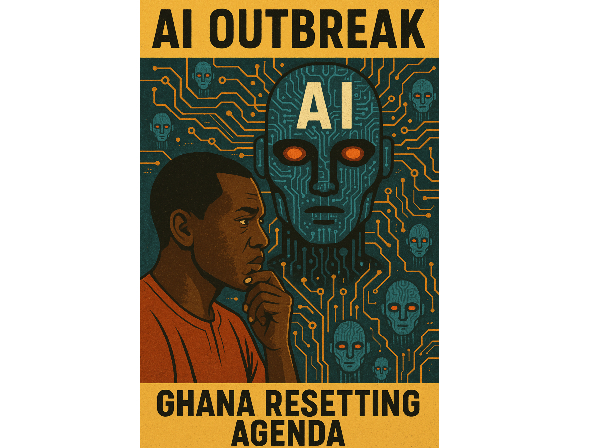A New Chapter in Ghana’s Story
As Ghana accelerates toward a 24‑hour economy and the “Digital Ghana” vision, artificial intelligence (AI) is no longer tomorrow’s promise—it is today’s reality. From Accra’s fintech hubs to the cassava farms of the Volta Region, AI-driven systems are reshaping how we learn, heal, trade, and govern. Yet this transformation brings a spectrum of outcomes: promise, peril, and pitfalls.
I. Positioning Ghana for Global AI Competitiveness
By 2030, artificial intelligence is expected to add $15.7 trillion to the global economy, with Africa poised to capture up to $1.2 trillion of that value. Ghana stands at a strategic crossroads—well-positioned to claim a substantial portion by aligning its AI roadmap with global best practices while innovatively solving domestic challenges.
Drawing inspiration from major players, such as the United States’ robust infrastructure investments (e.g., Stargate LLC’s $500 billion AI initiative) and Saudi Arabia’s emphasis on ethical AI and cultural localisation, Ghana can fast-track its digital transformation. Leadership in continental initiatives like the African Union’s Continental AI Strategy, alongside platforms such as the Ghana AI Summit and Awards, will elevate the nation’s influence in shaping Africa’s AI future.
AI as a Catalyst for Inclusive Growth
Case Study – mPharma’s Pharmaceutical Forecast
Home‑grown innovator mPharma leverages machine learning to predict drug demand across hundreds of pharmacies, slashing stock‑outs in rural clinics by over 40% (Adogla‑Bessa, 2023). This model of data‑driven health logistics can be replicated in agriculture, education, and beyond.
Precision Healthcare: Early demonstrations at Komfo Anokye Teaching Hospital show AI‑augmented diagnostics reducing misread scans by 25% (De Fauw et al., 2018).
Smart Farming: Platforms like AgroCenta harness predictive analytics for pricing and logistics, boosting smallholder incomes.
Digital Public Services: Pilot chatbots at the Ghana Revenue Authority streamline taxpayer inquiries, cutting response times in half
Strategic Upsides: accelerated service delivery, democratized expertise, and leapfrogged infrastructure gaps.
Emerging Challenges: rural‑urban digital divides and the need for affordable connectivity.
The Peril: When Ethics and Capacity Lag Behind Innovation
Without clear guardrails, AI systems risk mirroring—and magnifying—existing inequalities. In 2018, Amazon’s recruitment algorithm learned to downgrade female candidates because of historical hiring bias (Dastin, 2018). Ghana faces a similar hazard if local datasets fail to capture our linguistic diversity and cultural nuance.
Bias and Exclusion: AI tools that cannot interpret regional dialects may misclassify farmers’ loan applications.
Privacy Vulnerabilities: Ghana’s Data Protection Act (2012) must evolve to safeguard personal data in an AI‑driven economy.
Institutional Readiness: Regulatory bodies lack both the technical expertise and resources to audit complex algorithms.
Strategic Upsides: advanced analytics for crime prevention and traffic management.
Critical Downsides: erosion of public trust, unmonitored surveillance, and digital alienation.
II. The Pitfall: Weaponization of Information
The 2020 election cycle exposed how bot networks and manipulated content can inflame tensions and distort truth (Vincent, 2018). A more recent example comes from MTN Ghana’s Mobile Money platform, which in 2023 deployed an AI‑powered fraud‐detection engine—reducing transaction fraud by 30% and protecting half a million users (MTN Ghana, 2023). This same technology, if repurposed, could enable automated misinformation or financial exclusion at scale.
Deepfakes and Disinformation: Synthetic audio and video can undermine confidence in leadership and fuel polarization.
Autonomous Surveillance: Unregulated facial‑recognition tools threaten civil liberties when deployed in public spaces.
Cybersecurity Gaps: AI‑driven hacking tools can outpace our national cybersecurity infrastructure.
Strategic Prospects: AI‑assisted election monitoring and real‑time fraud alerts.
Potential Fallout: destabilized institutions and a pervasive culture of suspicion.
III. Path Forward: National‑Level AI Reset
To ensure AI serves Ghana’s aspirations, we must embed our values into every algorithm:
1. National AI Council: Convene experts from academia, industry, and civil society to co‑design ethical guidelines.
2. Localized Innovation Hubs: Fund regional AI labs that address sector‑specific challenges—from cocoa disease detection to diaspora engagement.
3. Digital Literacy for All: Launch a “Tech for Tomorrow” campaign, pairing community centers with AI‑tutored learning modules.
4. Data Sovereignty Framework: Amend the Data Protection Act to require transparency in AI models and data‑sharing agreements.
5. AI Fellowship & Exchange: Sponsor Ghanaian scholars and practitioners to collaborate with global AI ethics and policy leaders.
“The true measure of our digital maturity is not how clever our machines become, but how well they reflect the ideals we hold dear.” – Bismarck Kwesi Davis
Conclusion
Charting a Humane, High‑Tech Future
Ghana’s narrative is one of resilience and renaissance. As AI permeates our schools, hospitals, farms, and parliaments, we face a singular choice: to code with conscience or to automate our shortcomings. By fusing technological ambition with our time‑honored values of fairness, community, and ingenuity, Ghana can lead not only West Africa but the world into a future where intelligent machines amplify our humanity—never replace it.
References Adogla‑Bessa, D. (2023). mPharma’s AI approach to equitable healthcare distribution in West Africa. Citi Newsroom. https://citinewsroom.com
Dastin, J. (2018). Amazon scraps secret AI recruiting tool that showed bias against women. Reuters. https://www.reuters.com/article/us-amazon-com-jobs-automation-insight-idUSKCN1MK08G
De Fauw, J., Ledsam, J. R., Romera‑Paredes, B., Nikolov, S., Tomasev, N., Blackwell, S., … & Suleyman, M. (2018). Clinically applicable deep learning for diagnosis and referral in retinal disease. Nature Medicine, 24(9), 1342–1350.
MTN Ghana. (2023). MTN Ghana introduces AI‑based fraud detection for Mobile Money [Press release].
UNESCO. (2021). Recommendation on the Ethics of Artificial Intelligence. https://unesdoc.unesco.org/ark:/48223/pf0000381137
Vincent, J. (2018). Watch Jordan Peele use AI to make Barack Obama deliver a PSA about fake news. The Verge. https://www.theverge.com


